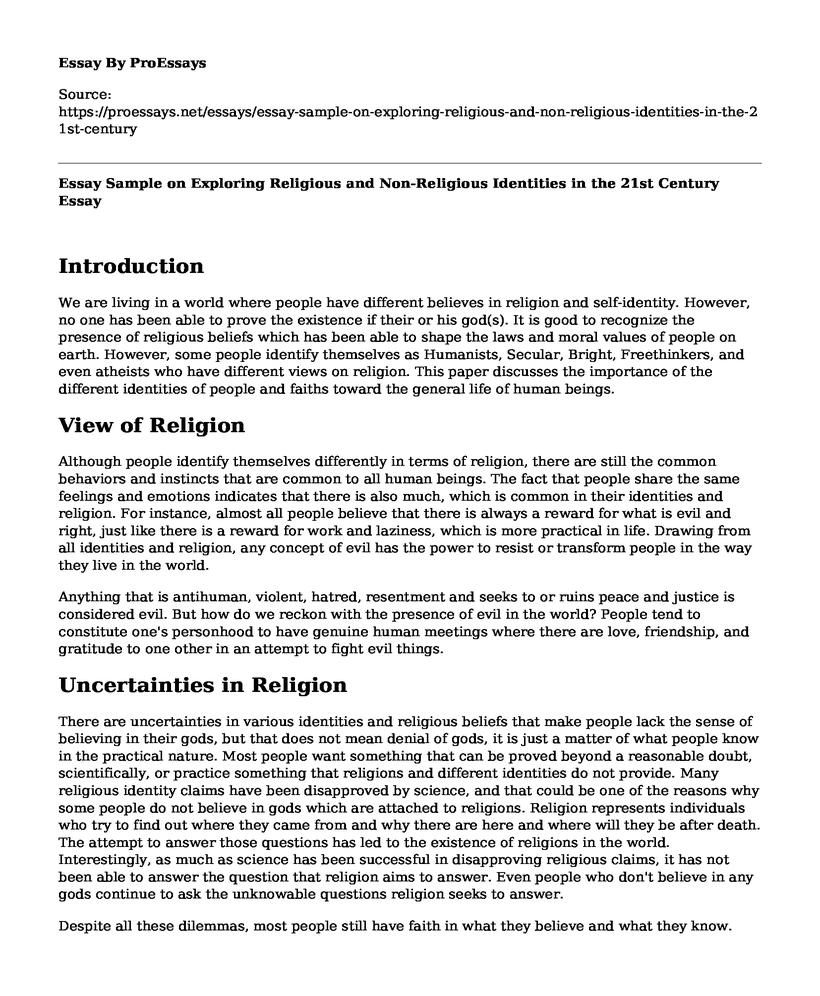Introduction
We are living in a world where people have different believes in religion and self-identity. However, no one has been able to prove the existence if their or his god(s). It is good to recognize the presence of religious beliefs which has been able to shape the laws and moral values of people on earth. However, some people identify themselves as Humanists, Secular, Bright, Freethinkers, and even atheists who have different views on religion. This paper discusses the importance of the different identities of people and faiths toward the general life of human beings.
View of Religion
Although people identify themselves differently in terms of religion, there are still the common behaviors and instincts that are common to all human beings. The fact that people share the same feelings and emotions indicates that there is also much, which is common in their identities and religion. For instance, almost all people believe that there is always a reward for what is evil and right, just like there is a reward for work and laziness, which is more practical in life. Drawing from all identities and religion, any concept of evil has the power to resist or transform people in the way they live in the world.
Anything that is antihuman, violent, hatred, resentment and seeks to or ruins peace and justice is considered evil. But how do we reckon with the presence of evil in the world? People tend to constitute one's personhood to have genuine human meetings where there are love, friendship, and gratitude to one other in an attempt to fight evil things.
Uncertainties in Religion
There are uncertainties in various identities and religious beliefs that make people lack the sense of believing in their gods, but that does not mean denial of gods, it is just a matter of what people know in the practical nature. Most people want something that can be proved beyond a reasonable doubt, scientifically, or practice something that religions and different identities do not provide. Many religious identity claims have been disapproved by science, and that could be one of the reasons why some people do not believe in gods which are attached to religions. Religion represents individuals who try to find out where they came from and why there are here and where will they be after death. The attempt to answer those questions has led to the existence of religions in the world. Interestingly, as much as science has been successful in disapproving religious claims, it has not been able to answer the question that religion aims to answer. Even people who don't believe in any gods continue to ask the unknowable questions religion seeks to answer.
Despite all these dilemmas, most people still have faith in what they believe and what they know. Above all, what is evil is arguably common to all. And as stated earlier, evil is what is against humanity, creating a lack of peace and indeed, justice and peace depend on the inward command and formality of wholeness of human personalities. In common sense, the judge is giving everybody his or her due. Society is, therefore, famous in the needs that match to generally attributed identities and religions.
Freedom of Faith
Belonging to any of these identities does not mean that you disagree with the claims of another character. Most people who are raised in a specific religion do not find the guts of interrogating the identity and other identities and determining which one to go. Only a few people get the freedom to explore spirituality and make a decision based on what they know and believe that is why most people belong to a religion which they were raised in. Someone is under reputation to change the mind because he/she is tied to one particular identity by the beliefs in it. Non-religious people and free thinkers, however, don't believe in God, but they believe in what is right and dispute what is evil according to the norms of society and law. The problem with religion is, people find that they do not differentiate the suffering which is inflicted by human beings, including humiliation and oppression and the decay which is brought by nature of the earth bringing confusion. For instance, if natural calamities such as diseases that may bring death are considered evil, it means that the mortal life itself is also evil. These facts do not clearly explain the mysterious reality of sin, which is against religion. Evil is the opposite of good, in most religious perspectives but according to freethinkers, it manifests itself in people's thoughts and failure to act and think as opposed to religions and identities which they perceive it as nature.
Conclusion
To conclude this matter, various dimensions should not view each other with suspicions and mistrusting each other. Everyone and every identity should maintain human nature and recognize truth and love as tools for happiness for all. People should not take evil seriously, causing hatred among people.
Cite this page
Essay Sample on Exploring Religious and Non-Religious Identities in the 21st Century. (2023, Feb 12). Retrieved from https://proessays.net/essays/essay-sample-on-exploring-religious-and-non-religious-identities-in-the-21st-century
If you are the original author of this essay and no longer wish to have it published on the ProEssays website, please click below to request its removal:
- Muslim Representation in Cinemas Essay
- Including Client Spirituality or Religious Beliefs in Therapy Essay
- Essay Sample on the War on Islamic Law: The Impact of Terrorism on Religious Relations
- How Buddhist Beliefs Influence Attitudes Towards the Chandalas - Essay Sample
- Persecution of Christianity in Ancient Rome: King Nero's Role
- Essay Example on Women's Leadership in Church: Bible vs Culture
- Essay on Praising the Creator: A Song to Celebrate with Earth Community







